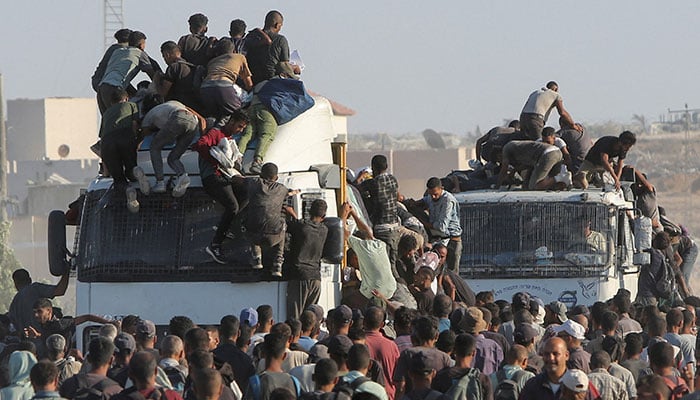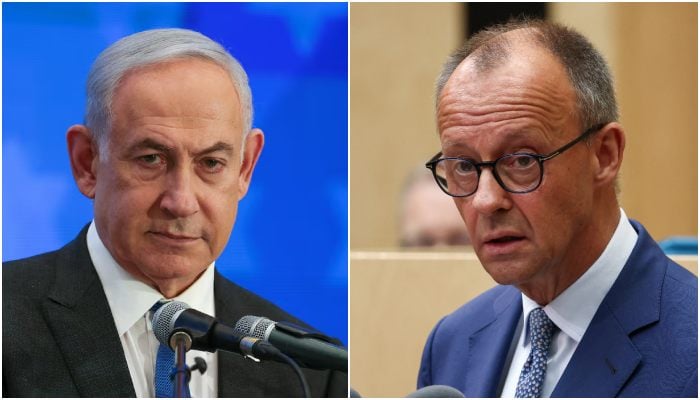Select Language:
- Friedrich Merz: Israel’s actions will not meet its declared war objectives.
- Images of starving children are eroding decades of policy.
- This shift indicates growing frustration in Germany and increasing public criticism.
BERLIN — The deepening humanitarian crisis in Gaza, coupled with Israel’s plans to expand military dominance over the territory, has prompted Germany to halt arms exports to Israel. This marks a significant change, driven largely by rising public concern.
Conservative Chancellor Friedrich Merz announced on Friday that Germany would suspend arms shipments to Israel, citing doubts that Israel’s military actions will achieve its goals of defeating Hamas and securing the release of Israeli hostages.
Merz, who after his election in February had invited Prime Minister Benjamin Netanyahu to Germany despite an ICC arrest warrant, is making a bold political statement with this move.
The shift signals that Germany’s traditionally unwavering support for Israel, rooted in its historical guilt over the Holocaust, is being challenged as mounting Palestinian casualties, widespread destruction, and heartbreaking images of hungry children threaten to alter long-standing policies.

“This is a significant first step by the German government. However, I wouldn’t call it a complete reversal, but rather a ‘warning shot’,” said Muriel Asseburg, a researcher at the German Institute for International and Security Affairs.
The decision follows months of the German government taking a firmer stance regarding Israel’s escalating military operations in Gaza, though it largely avoids the more aggressive measures suggested by some European nations and factions within Merz’s coalition.
The arms suspension primarily affects weaponry that could be used in Gaza.
The move reflects a shift in public sentiment, with Germans increasingly critical of Israel and demanding greater efforts to address the humanitarian catastrophe — where most residents are either displaced or living amid rubble.

An ARD-DeutschlandTREND survey released Thursday, just before Merz’s announcement, found that 66% of Germans want their government to exert more pressure on Israel to change its behavior. This is a rise from April 2024, when 57% felt the government should criticize Israel more strongly over its Gaza actions, according to a Forsa poll.
Despite Germany’s efforts to deliver aid via airlifts, 47% of Germans believe their government is doing too little for Palestinians, compared to 39% who think efforts are sufficient.
Interestingly, only 31% of Germans feel a greater responsibility toward Israel due to their past, a core aspect of Germany’s foreign policy, whereas 62% do not.

Germany’s stance, long shaped by its unique historical responsibility, known as “Staatsraison,” stems from the Holocaust legacy, as articulated by Angela Merkel in 2008 to the Israeli parliament.
Days before his recent trip to Israel in July, Foreign Minister Johann Wadephul told Die Zeit that Berlin cannot remain a neutral mediator because it is inherently partisan, backing Israel unequivocally — a sentiment shared by other conservative factions.

Meanwhile, Merz’s coalition partner, the Social Democrats (SPD), has expressed clearer intentions to consider sanctions against Israel, with foreign policy spokesperson Adis Ahmetovic stating that suspending weapon shipments is just the beginning. He emphasized the need for broader actions, such as suspending parts of the EU Association Agreement or organizing medical evacuations for injured children, and lifting bans on sanctions against Israeli officials.
Growing Divisions
Within Germany, the political debate and media coverage reflect the country’s increasing division over its stance on Israel. In late July, Der Spiegel criticized Israel for breaching international law and accused the German government of complicity, featuring a cover photo of Gaza women holding empty bowls with the headline “A Crime”.
In contrast, Bild, owned by Axel Springer and Germany’s largest newspaper, pointed out a rise in anti-Israel protests and protests perceived as biased.

Correspondent Filipp Piatov from Bild criticized Chancellor Merz on Friday, accusing him of reducing support to an ally amidst war — a move seen as conflicting with his previous critiques of such policies.
Israel disputes allegations of deliberately starving Gaza and claims that Hamas could resolve the crisis by surrendering.
Since the start of the conflict, over 60,000 Palestinians have been killed, according to Gaza’s health authorities.
Critics argue Germany’s cautious approach impairs the West’s capacity to leverage pressure and restrict aid, thereby prolonging suffering in Gaza.
Germany had been particularly hesitant to endorse even limited sanctions like suspending parts of its participation in the EU’s flagship research program.
Factors influencing Germany’s reluctance include its extensive trade ties with Israel and the U.S. The country is Israel’s second-largest arms supplier after the U.S. and procures military equipment from Israel, such as the Arrow-3 missile defense system, part of a larger force modernization effort since Russia’s 2022 invasion of Ukraine.
Recently, Israeli defense firm Elbit Systems announced a $260 million deal with Airbus to upgrade the German Air Force’s A400M aircraft with infrared defense systems.
“Germany’s hubris should be avoided,” stated Volker Beck, a former MP and head of the German-Israeli Society, warning that retaliatory restrictions from Israel could threaten German air defense capability.






